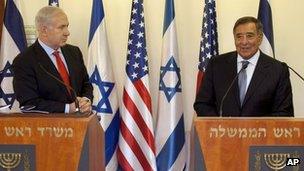Obama steers cautiously on Iran
- Published
- comments

Benjamin Netanyahu and Leon Panetta met in Jerusalem at the beginning of the month
Everyone agrees this November's presidential election is about "the economy, stupid".
US President Barack Obama will be hoping that conventional wisdom is not upset by events outside his control.
Not because America's unsteady recovery is such fertile ground for him, but because the alternative would probably be far worse. The president wants his foreign policy boast to be that he has ended two wars, not started two new ones.
If Israel bombed Iran, external it would rather overshadow the latest unemployment figures, and present the president with unattractive choices.
Nor does he want the situation in Syria to spiral downwards, external even further, until American military entanglement seems inevitable.
So, part of Secretary of Defense Leon Panetta's job at the moment is to keep the lid on and keep American forces out of action, external - and he reinforced that point at a Pentagon news conference.
He smiled a thin smile as he was asked about the likelihood of an Israel attack, external, and repeatedly twisted his fingers together as the reporter finished his question.
He said: "I don't believe they've made a decision as to whether or not they will go in and attack Iran at this time.
"Obviously, they're an independent, sovereign country. They'll ultimately make decisions based on what they think is in their national security interest. But I don't believe they made that decision at this time."
Narrowing windows
This may mean simply that he does not think the hawks, led by Israeli Prime Minister Benjamin Netanyahu, have yet garnered all the cabinet votes they need, external - and that could be about to change. Or not.
Mr Panetta has just come back from a trip to the region, external, which is again awash with rumours that an attack is just weeks away - a view the government there does little to discourage, external.
However, Mr Panetta said: "The reality is that we still think there is room to continue to negotiate. The additional sanctions have been put in place. They're beginning to have an additional impact on top of the other sanctions that have been placed there."
That was, no doubt, the argument he put to Israel's leaders, and it was no accident that he said he agreed with the Israeli prime minister that "any kind of military action ought to be the last alternative, not the first".
Asked if the window for such military action was "almost shut", he said, "the window is still open to try to work towards a diplomatic solution".
The Chairman of the Joint Chief of Staff General Martin Dempsey, who was by his side, said that Israel might have capacities he did not know about, external, but added: "I think that it's a fair characterisation to say that they could delay but not destroy Iran's nuclear capabilities."
All this talk of narrowing windows is because of the idea that there is a point of no return, external, when Iran has put any enriched uranium deep enough underground that it is out of reach of Israeli bombs.
But it is also about the election timetable. Some say Mr Obama would be more likely to support any action before an election. Afterwards, if re-elected, he would have more options.
When it came to Syria, Mr Panetta said that a no fly zone, external "was not on the front burner". While he confirmed the Pentagon was looking at military options, he sounded distinctly unenthusiastic about them, stressing that America was planning alongside its allies.
But he mentioned Iran in this context as well, saying it was obvious that they were playing a "larger role" in Syria and that their "growing presence" was a "deep concern".
He said they were adding to the killing by training pro-government militia and that was "dangerous".
There is a cynical view that sometimes a small war can help in the middle of an election.
But it would be hard to keep any conflict with Iran contained, external and many think, apart from the actual rights and wrongs, it would bring huge uncertainty and destabilise the already shaky world economy.
I have no doubt Mr Obama's preference for avoiding widespread conflict is heartfelt, but it is tactical as well.